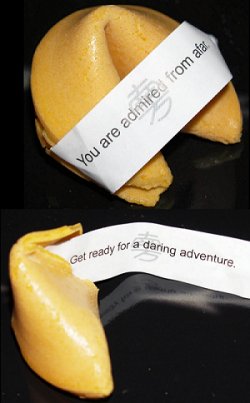Believing in Magic
Today, we believe magic. The University of Houston's College of Engineering presents this series about the machines that make our civilization run, and the people whose ingenuity created them.

Several years back, I decided to create a superstition. I decided that my fortune cookie would predict an accurate future, only if I ate the cookie fully, before I read the fortune. I've done that ever since and the fortune always comes true. The last cookie said "You will prosper if you work hard." I loafed about and, sure enough, I did not prosper. So, you see, it really does work.
I mention that because of an article by Benedict Carey in today's Science Times, "Do You Believe in Magic?" A number of psychologists have been trying to understand why so many of us act out a belief in magic, even when we consciously reject it.
Just consider: "I won't change shirts until we've won the World Series." Or "When I saw cloud formation that looked like a gopher, I knew I should go to Minnesota instead of Stanford." And why don't hotels have thirteenth floors?
Carey distinguishes between magic and religion. Religion deals with larger issues, things like human well-being, morality, the search for understanding. Of course religion suffers when people let it be taken over by magic. So why do we do these things?
For one thing, we tend to repeat what once worked. If I wore my green shirt when we won the conference, I'd better wear it at the championship game. I suppose it's atavistic. We know perfectly well our shirt has nothing to do with the ball game, but that kind of repetition is a survival-of-the-fittest side effect.
 And psychologists have noted something more. Our belief in a rabbit's foot or lucky number seven flourishes when we're down. The most disadvantaged is the most superstitious. When we cannot prevail by our own efficacy, we try to prevail by other means.
And psychologists have noted something more. Our belief in a rabbit's foot or lucky number seven flourishes when we're down. The most disadvantaged is the most superstitious. When we cannot prevail by our own efficacy, we try to prevail by other means.
Take gambling: All managed gambling is stacked in favor of the house. Any rational person knows he won't win in the long run. The belief that he can is pure superstition. And we use that belief to create systems by which the poor willingly support the rich. We vote in state-run lotteries and gambling machines -- clearly the most unbalanced of all forms of taxation.
 Yet psychologists find that our various magic rituals have the benefit of staving off depression. They do so by creating the illusion that we can be effective just when we think we aren't.
Yet psychologists find that our various magic rituals have the benefit of staving off depression. They do so by creating the illusion that we can be effective just when we think we aren't.
But a little goes a long way. Think about the TV sit-com Monk. The obsessive-compulsive detective Adrian Monk is so paralyzed by repetitive ritual that he has a hard time just walking down the street. He endows germs with such magical power, that he finds even shaking hands to be impossible.
Most of us are less wed to our rituals than Adrian Monk. We pursue some, just to maintain order in our lives, like lining up our shirts and laying out our shaving gear. But we're able to change when circumstances merit change -- most of us, most of the time. But don't even think about getting me to read my fortune cookie before I've eaten it. We don't want Earth shifting upon its axis.
I'm John Lienhard, at the University of Houston, where we're interested in the way inventive minds work.
B. Carey, Do You Believe in Magic? The New York Times, Science Times,Tuesday, January 23, 2007, pp. D1 and D6.

JHL's fragment of Blarney Stone -- obtained with the help of cereal box tops, ca. 1940. (A talisman meant to bestow the gift of fluent speech.)
All images by JHL.